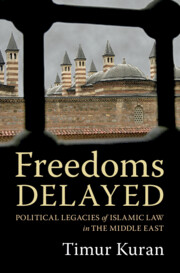Book contents
- Freedoms Delayed
- Freedoms Delayed
- Copyright page
- Dedication
- Contents
- Figures
- Tables
- Preface
- Part I The Modern Middle East’s Authoritarian Face
- Part II Persistent Social Atomization
- 3 Nongovernmental Organizations under Islamic Law
- 4 The Political Impotence of Islamic Waqfs
- 5 Waqf Corruption and Its Degradation of Civic Life
- 6 The Islamic Waqf’s Long Civic Shadow
- Part III Religious Repression
- Part IV Economic Hindrances
- Part V Conclusion
- Notes
- Bibliography
- Index
6 - The Islamic Waqf’s Long Civic Shadow
from Part II - Persistent Social Atomization
Published online by Cambridge University Press: 20 July 2023
- Freedoms Delayed
- Freedoms Delayed
- Copyright page
- Dedication
- Contents
- Figures
- Tables
- Preface
- Part I The Modern Middle East’s Authoritarian Face
- Part II Persistent Social Atomization
- 3 Nongovernmental Organizations under Islamic Law
- 4 The Political Impotence of Islamic Waqfs
- 5 Waqf Corruption and Its Degradation of Civic Life
- 6 The Islamic Waqf’s Long Civic Shadow
- Part III Religious Repression
- Part IV Economic Hindrances
- Part V Conclusion
- Notes
- Bibliography
- Index
Summary
Though the Islamic waqf is defunct, the Middle East now features modern organizations known also as waqfs. The modern waqf is essentially a philanthropic or charitable corporation. It is self-governing and has a perpetual existence. Along with other autonomous nongovernmental organizations known under different names, the modern waqf provides the institutional basis for a vigorous civil society. Yet across the Middle East civil society remains weak. This is due to two factors, both legacies of the Islamic waqf. First, a century is a short time to develop the civic skills that the Islamic waqf left uncultivated for a millennium. The region is still learning how to build politically effective NGOs. And second, the anemic civic life engendered by the Islamic waqf provided fertile ground for the repressive regimes of modern times. The region’s autocracies try systematically to keep civil society politically weak. From the standpoint of liberalization, a hopeful sign is that the region’s current NGOs, unless captured by the state, are serving as founts of civic education. Promoting a culture of bargaining and compromise, they are teaching how to communicate ideas and form coalitions.
Keywords
- Type
- Chapter
- Information
- Freedoms DelayedPolitical Legacies of Islamic Law in the Middle East, pp. 89 - 108Publisher: Cambridge University PressPrint publication year: 2023



